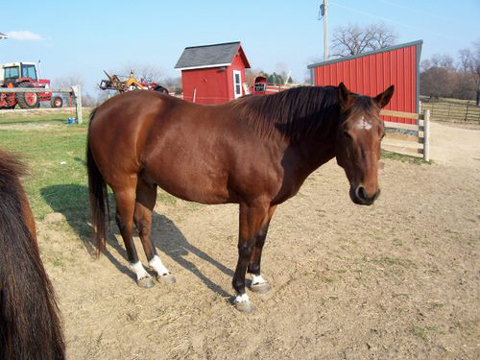
by: Marie Rosenthal, MS
January 26 2011, Article # 17603 on thehorse.com
According to Alex Dugdale, MA, VetMB, DVA, Dipl. ECVA, MRCVS, a senior lecturer in the school of veterinary science at the University of Liverpool in England, “obesity (in horses) creeps up on us.” When it comes to battling obesity, keeping the horse healthy and happy while still helping him drop weight is of paramount importance.
Dugdale and her colleagues recently completed a study in which they restricted the food intake for five obese Welsh Mountain pony mares for three months by limiting daily dry matter intake to 1% of the animal’s body mass. This helped the ponies lose, on average, about 30 kg (66 lbs.) during the span of the study, Dugale said.
To help obese horses safely shed the appropriate amount of weight, Dugale offered these dieting tips:
* Weight loss takes time. Stick to a diet for at least two months;
* Get advice from the horse’s veterinarian and a nutritionist to decide how much food to restrict and whether the animal needs supplements to maintain a balanced diet;
* Try to avoid free foraging; instead feed three to four small meals a day to better control what the horse eats;
* Limit (ideally, exclude) treats, including apples and carrots;
* Weigh food rather than “eyeball” it;
* Monitor weight loss once a week at the same time of day, and record the information in a convenient location; and
* Exercise the horse (providing they are sound) to burn more calories.
Dugdale also suggests that using double-layered hay nets can extend a horse’s mealtime and reduce boredom when stalled. If manger feeding, add obstacles such as large stones to the manger so the horse has to work to find his food.
Want to determine your horse’s weight? Learn how with our video tutorial and Horse Weight Calculator by clicking HERE.
Other forms of environmental enrichment can reduce a horse’s boredom while confined from grazing on pastures. For instance, some horses will play with stable toys, Dugale said, but others will be happier in graze-poor paddocks with herdmates or turned out wearing a grazing muzzle.
“Getting outside and exercising is important for energy expenditure, socializing, and general well-being, so grazing-muzzles are useful, but make sure the animal can drink water through the muzzle,” Dugdale said.
The study, “Effect of dietary restriction on body condition, composition and welfare of overweight and obese pony mares” was recently published in the Equine Veterinary Journal. The abstract is available on PubMed.
